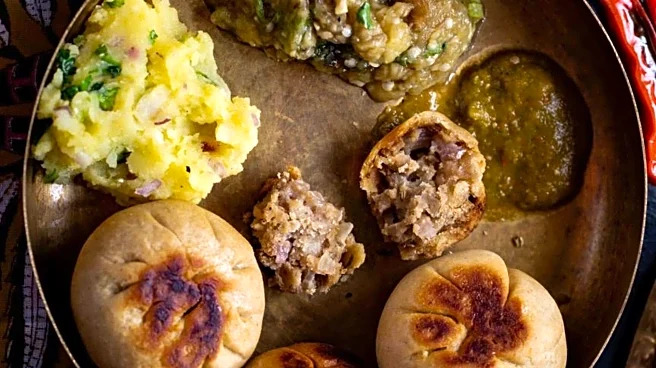What is the story about?
Travellers who thought their hotel bills would be lighter on their pockets after September 22 have come in for a bit of a shock. Despite the recent GST rate reduction on hotel rooms, travellers report little to no decrease in their bills.
For instance, a user on X (formerly Twitter) Harshdeep Rapal shared his experience in a post: “Whenever I visit Golden Temple, I book the same hotel. It generally costs between ₹5,500 and ₹6,500 a night via @MakeMyTrip. Now, since GST has been reduced from 18% to 5% for rooms under ₹7,500, I expected a lower tariff. But it’s exactly the same: ₹5,581. @MakeMyTrip: Is GST calculated on the original ₹14,499 or the discounted ₹3,879? Even if it’s on the original price, the math’s not mathing.”
CNBC-TV18 has not independently verified the tweet.
Online travel agencies (OTAs) have been seeking clarity from the Central Board of Indirect Taxes and Customs (CBIC) since the revised rates were announced on September 3, 2025 and came into effect on September 22.
Previously, OTAs could offset GST on bulk bookings and pass savings to customers by claiming it as ITC.
But, with new rates, benefits of claiming ITC has been withdrawn, thus increasing the GST outgo, which OTAs have passed on to the end consumer.
In its representation to the CBIC, OTA industry warned that the mid-market and budget hotel segments—the backbone of online bookings—are most vulnerable.
The removal of ITC revives the cascading tax effect GST aimed to eliminate, squeezing margins and complicating pricing strategies.
Meanwhile, in a separate representation to the CBIC, the Federation of Hotel & Restaurant Associations of India (FHRAI) echoed similar concerns.
FHRAI President Surendra Kumar Jaiswal explained at the 69th AGM that mid-market hotels now face unrecoverable GST costs that increase operating expenses, reduce affordability, and deter investment.
“A refurbishment project worth ₹1 crore could now attract ₹18 lakh in non-creditable GST, straining liquidity and long-term financial stability,” he further explained the challenges faced by the sector.
Tax experts agree. Rahul Shekhar, Partner at Nangia Andersen LLP, notes that hotels may absorb ITC costs or pass them on to consumers, impacting profitability.
Ikesh Nagpal, Lead-Indirect Taxes at AKM Global, warns that “removal of ITC risks higher costs, disrupted growth, and reduced competitiveness, especially in budget and mid-tier hotels.”
The problem, however, lies in the denial of Input Tax Credit (ITC) for the lower slab at various levels. For instance, Hotels can no longer claim back GST paid on key inputs like rent, utilities, outsourced services, and capital expenditure—making GST a non-creditable cost.
This structural flaw forces hotels to absorb additional expenses, preventing price reductions from reaching consumers, claims FHRAI.
Economically, the timing is critical. Domestic tourism is rebounding strongly, with 2024 domestic spend projected to exceed ₹16 trillion, the FHRAI said.
Budget and mid-market hotels outside metros drive this recovery, but the GST change threatens to stall investment and expansion, risking millions of livelihoods in India’s tourism ecosystem, the FHRAI added.
The government now faces a tough choice: maintain a low GST rate without ITC or restore ITC to prevent cascading costs and preserve investment incentives.
FHRAI has proposed solutions, including restoring ITC for rooms priced ≤ ₹7,500 or allowing hotels to opt for 18% GST with ITC, clarifying compliance on bundled services, and structural reforms recognising hospitality as infrastructure to unlock credit and ease approvals.
And OTAs also seeking restoration of ITC benefits at the reduced 5% rate for this segment.
For instance, a user on X (formerly Twitter) Harshdeep Rapal shared his experience in a post: “Whenever I visit Golden Temple, I book the same hotel. It generally costs between ₹5,500 and ₹6,500 a night via @MakeMyTrip. Now, since GST has been reduced from 18% to 5% for rooms under ₹7,500, I expected a lower tariff. But it’s exactly the same: ₹5,581. @MakeMyTrip: Is GST calculated on the original ₹14,499 or the discounted ₹3,879? Even if it’s on the original price, the math’s not mathing.”
CNBC-TV18 has not independently verified the tweet.
Online travel agencies (OTAs) have been seeking clarity from the Central Board of Indirect Taxes and Customs (CBIC) since the revised rates were announced on September 3, 2025 and came into effect on September 22.
Previously, OTAs could offset GST on bulk bookings and pass savings to customers by claiming it as ITC.
But, with new rates, benefits of claiming ITC has been withdrawn, thus increasing the GST outgo, which OTAs have passed on to the end consumer.
In its representation to the CBIC, OTA industry warned that the mid-market and budget hotel segments—the backbone of online bookings—are most vulnerable.
The removal of ITC revives the cascading tax effect GST aimed to eliminate, squeezing margins and complicating pricing strategies.
Meanwhile, in a separate representation to the CBIC, the Federation of Hotel & Restaurant Associations of India (FHRAI) echoed similar concerns.
FHRAI President Surendra Kumar Jaiswal explained at the 69th AGM that mid-market hotels now face unrecoverable GST costs that increase operating expenses, reduce affordability, and deter investment.
“A refurbishment project worth ₹1 crore could now attract ₹18 lakh in non-creditable GST, straining liquidity and long-term financial stability,” he further explained the challenges faced by the sector.
Tax experts agree. Rahul Shekhar, Partner at Nangia Andersen LLP, notes that hotels may absorb ITC costs or pass them on to consumers, impacting profitability.
Ikesh Nagpal, Lead-Indirect Taxes at AKM Global, warns that “removal of ITC risks higher costs, disrupted growth, and reduced competitiveness, especially in budget and mid-tier hotels.”
The problem, however, lies in the denial of Input Tax Credit (ITC) for the lower slab at various levels. For instance, Hotels can no longer claim back GST paid on key inputs like rent, utilities, outsourced services, and capital expenditure—making GST a non-creditable cost.
This structural flaw forces hotels to absorb additional expenses, preventing price reductions from reaching consumers, claims FHRAI.
Economically, the timing is critical. Domestic tourism is rebounding strongly, with 2024 domestic spend projected to exceed ₹16 trillion, the FHRAI said.
Budget and mid-market hotels outside metros drive this recovery, but the GST change threatens to stall investment and expansion, risking millions of livelihoods in India’s tourism ecosystem, the FHRAI added.
The government now faces a tough choice: maintain a low GST rate without ITC or restore ITC to prevent cascading costs and preserve investment incentives.
FHRAI has proposed solutions, including restoring ITC for rooms priced ≤ ₹7,500 or allowing hotels to opt for 18% GST with ITC, clarifying compliance on bundled services, and structural reforms recognising hospitality as infrastructure to unlock credit and ease approvals.
And OTAs also seeking restoration of ITC benefits at the reduced 5% rate for this segment.
/images/ppid_59c68470-image-175925257203154099.webp)


/images/ppid_a911dc6a-image-177063961975577596.webp)
/images/ppid_a911dc6a-image-177063953658055705.webp)
/images/ppid_59c68470-image-177064015596259255.webp)
/images/ppid_59c68470-image-177064009202239839.webp)
/images/ppid_59c68470-image-177064003979413356.webp)
/images/ppid_59c68470-image-177064003451616235.webp)
/images/ppid_59c68470-image-17706400863306393.webp)




